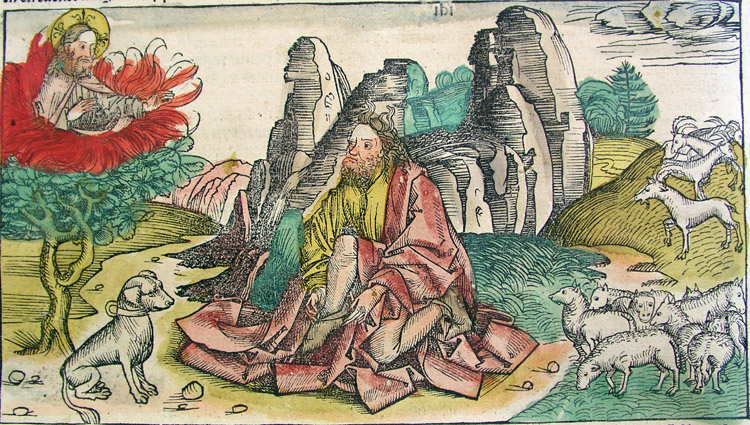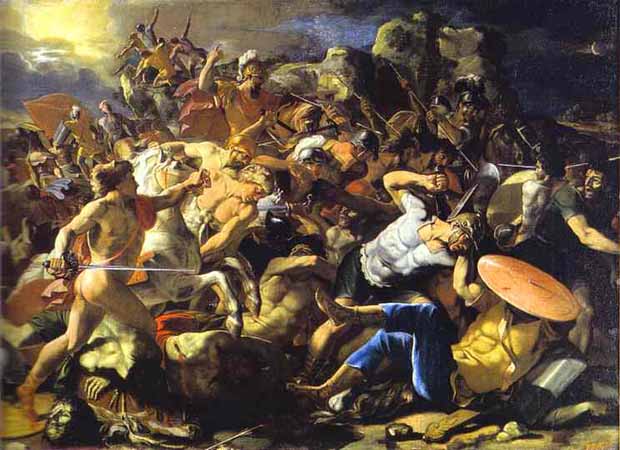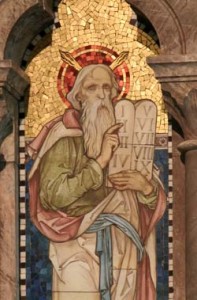 In the previous couple of weeks, we looked at two figures from deep history: Sargon the Great of Akkad, and Akhenaten of Egypt, both of whom once existed in the flesh. I cannot make that claim about our third character, even though hundreds of millions of people have believed in his existence over the millennia, and he is easily more famous than either Sargon or Akhenaten.
In the previous couple of weeks, we looked at two figures from deep history: Sargon the Great of Akkad, and Akhenaten of Egypt, both of whom once existed in the flesh. I cannot make that claim about our third character, even though hundreds of millions of people have believed in his existence over the millennia, and he is easily more famous than either Sargon or Akhenaten.
Moses is a seminal figure in all three Abrahamic faiths, Christianity, Judaism, and Islam. He is considered an iconic liberator, who defied Pharaoh and led his people out of slavery in Egypt to a new home in the promised land; a lawbringer, through whom God laid out the moral foundation on which our civilization is built, in the form of the Ten Commandments; God’s own inspired secretary, writing down the Pentateuch at God’s dictation. A great prophet, a great leader, a father to his people—and withal, a humble, modest man, who would have been ever so much happier if God had chosen somebody else. At least, that’s how Moses described himself—and would he lie? Of course not. He was Moses.
His is a great story, very gripping, full of action and colour—and very unlikely to contain more than a few grains of historical truth. While fundamentalist scholars take it all terribly literally, the Moses cycle has the earmarks of a generic national origin myth, written down in various versions between 950 and 400 BC; some scholars even place the completion and redaction a little later, in the Seleucid period, after 300 BC. As well, there is a rich body of Mosaic traditions dating to Hellenistic and Roman times, with even more layers of myth accreting later in rabbinical and finally Islamic writings. And still, alas, there is not one convincing shred of archaeological or historical evidence that Moses existed or that the Exodus from Egypt ever took place, at least as recorded in the Old Testament.
But forget all that for a few minutes. For the purposes of this exercise, we’re going to take the story at face value, and ask these questions: does the Moses of scripture and myth display any of the traits seen in Sargon, Akhenaten, and latter-day prophets and messiahs? And do the events recounted in Exodus show any indicators of a messianic cult in operation? And was he really such a good guy? As a framework, I’ve compiled a checklist of cult motifs from previous installments of this series:
1. The prophet displays a narcissistic/grandiose personality.
Check. Judging by his self-description and the hissy fits he throws whenever the Children of Israel cross him in the smallest degree, Moses comes across as a classic narcissist and a most unpleasant character: dictatorial, jealous, impossible to please, indecisive, unforgiving, quick to blame others for his own mistakes. In fact, he seems to have modeled himself on the extremely violent and narcissistic Bronze Age deity he sold to the children of Israel. Unless, of course, he was modelling that deity upon himself.
2. The prophet’s origin has heroic, mythic or romanticized elements.
Check. The whole basket-in-the-bulrushes-pharaoh’s-daughter thing looks suspiciously like a variant of stories associated 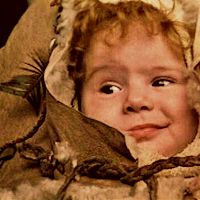 with Sargon the Great, Romulus and Remus, and so forth, with the interesting twist that the usual order of things is reversed. In many examples of the “lost child” trope, the child is royal by birth but raised in obscurity; Moses, however, is born a slave and raised as a prince. Some of the extra-biblical sources pile on other legendary details, including Moses as a war hero in Nubia, conquering a great Kushite city by first capturing the heart of the king’s daughter. In some versions, the massacre of Israelitish children is not to keep the Israelites down, as in the Bible, but to shortcircuit a prophecy: that an Israelitish child will grow up to overthrow the pharaoh. This trope again puts Moses in good messianic company: Sargon, Jesus, Oedipus, Hercules, and many more, right on down to Snow White and the adorable Elora Danan.
with Sargon the Great, Romulus and Remus, and so forth, with the interesting twist that the usual order of things is reversed. In many examples of the “lost child” trope, the child is royal by birth but raised in obscurity; Moses, however, is born a slave and raised as a prince. Some of the extra-biblical sources pile on other legendary details, including Moses as a war hero in Nubia, conquering a great Kushite city by first capturing the heart of the king’s daughter. In some versions, the massacre of Israelitish children is not to keep the Israelites down, as in the Bible, but to shortcircuit a prophecy: that an Israelitish child will grow up to overthrow the pharaoh. This trope again puts Moses in good messianic company: Sargon, Jesus, Oedipus, Hercules, and many more, right on down to Snow White and the adorable Elora Danan.
3. The prophet receives a millenarian, revitalizing or revolutionary revelation.
Check. A millenarian revelation usually involves things getting a whole lot worse until an apocalyptic rain of misfortunes finally brings down the old order – after which the faithful get to live in a newly reconstituted and purified version of Earth. (A surprising number of phenomena—from Charles Manson’s helter-skelter to Milton Friedman’s economic shock therapy—make sense when viewed as millenarian prophecies.) In Exodus, the theme makes several appearances. The Children of Israel, by following Moses’ instructions regarding hyssop, blood, and doorframes, escape the apocalyptic horrors of Passover; by faith, they pass through the Red Sea, which finishes the job of sweeping away the old order; and they eventually receive their reward in the form of a land flowing with milk and honey—at the cost of visiting their own apocalyptic violence on the inconvenient residents of the promised land.
4. The revelation arrives in a vision during a period of illness, or in exile, or in a solo sojourn in the wilderness.
Check. Moses spent many years in exile—the revelation came out of a burning bush, in the wilderness. Nuff said. But this is a powerful theme to watch for in the messianic narratives we will be looking at later in the series.
5. This vision gives the prophet an exclusive monopoly on some universal truth.
Check. Jehovah was to be worshipped as the ONLY god, and Moses was his only prophet. The Children of Israel were specially chosen, out of all the peoples of the world, to have an exclusive contract with the creator of the entire universe.
6. The prophet validates his message by performing miracles of prophecy, healing, or magic.
Check. Magic is a constant theme: the magical snake duel with Pharaoh’s sorcerers, the series of supernatural plagues and their supernatural cures, the crossing of the Red Sea, the dowsing for water in the desert, the miracle of manna, etc etc.
7. The prophet gathers an inner circle, which may include a consort or a charismatic successor.
Check. The initial inner circle, Aaron and Miriam, fell out of favour; but Joshua and Aaron’s sons—those that survived a nasty and rather suspicious accident with holy fire—took up the slack. No particular preeminent consort showed up in the story, though several wives are recorded in both the Bible and the extrabiblical sources; in fact, Miriam and Aaron fell out with Moses over a mysterious dispute concerning a Kushite woman, perhaps a cryptic reference to the kind of sexual profligacy that seems so characteristic of messianic personalities.
8. The prophet also gathers an outer circle of followers, from whom he demands obedience, devotion and sacrifice.
The Children of Israel, poor sods. They are cognate with, for example, Peter Popoff’s tv congregation, the mass wedding parties of the Moonies, and 99.99% of the population of North Korea.
9. The prophet issues numerous draconian rules and commandments.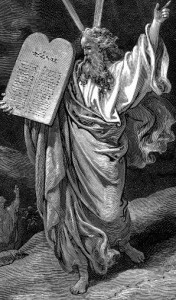
Yes, in spades. The two slightly different sets of Ten Commandments are only the tip of the iceberg. There are hundreds of commandments in the Pentateuch, some of them insanely petty, and picky. The effect, clearly, is to establish and maintain tight control over all aspects of the followers’ lives, including the sexual.
10. The prophet’s demands are enforced by threats of excommunication or other penalties.
Check. Moses instituted extreme penalties, up to and including death, with the worst reserved for sins of blasphemy or idolatry—which, specifically, are sins that indicate less than perfect devotion to the deity and his prophet. Not to mention a collective punishment of forty extra years in the wilderness for the golden calf episode; and a deadly plague as punishment for griping about too much manna in the diet.
11. The prophet insulates the movement from outside influences, even up to a literal move into the wilderness.
Yes again, including marching them all off into the wilderness for forty years; and instituting dire penalties for consorting with heathens, from death up to—again—collective punishment in the form of plagues and other disasters. Of course, it is always the victims who are blamed, for being a stiff-necked people and daring to question or disappoint God.
12. The prophet defines outsiders as fair game, and nurture a special fury for apostates.
Check; the scientological concept of “fair game” fits, and nastily so. Genocide was demanded against any tribe of outsiders that crossed the path of the Children of Israel, or held land that Moses felt was in Jehovah’s gift to them; while apostates or rebels tended to get swallowed by the earth or devoured by fire, along with their families and friends and anybody who happened to be standing too close to them at the time.
13. When the messiah dies or fails, the inner circle may rationalize the failure and carry on in the leader’s name. In which case, the movement may survive and eventually even routinize into a more sustainable form.
What happened after Moses’ death? His prophecy of entering the Promised Land did not work for him, nor for any of those who left Egypt at his side. This was rationalized as punishment for various sins along the way. After his death, however, the successor figure Joshua—Stalin to Moses’ Lenin, Brigham Young to Moses’ Joseph Smith—did at last manage to cross the Jordan and take possession of the land of milk and honey, after lots of judicious ethnic cleansing.
All the motifs are there, but Jews, Christians and Muslims believe that Moses was different from any of the other prophets and messiahs running around at any given time, because God really was leading the Children of Israel and telling Moses what to do. Of course, they would say that; in fact, it’s what all followers say about their master or messiah. Nonbelievers might be more struck by how suspiciously well Moses and the Exodus match the characteristics of other messianic movements, including (as we shall see) ones that are clearly and indefensibly evil, destructive, or just plain stupid. In fact, the fit is so good that I am inclined to believe there may be a grain of truth to the story, heavily mythologized, perhaps based on a routinized tribal cult wandering the Jordan Valley in late bronze age times. But at this remove, as in the rather similar case of Jesus, that can only be speculation.
Next week: Emperors of the Last Days

